牛津深圳版九年级下册Module3Sport and health Unit 6 Caring for your health Vocabulary习题课件(共17张PPT)
文档属性
| 名称 | 牛津深圳版九年级下册Module3Sport and health Unit 6 Caring for your health Vocabulary习题课件(共17张PPT) | 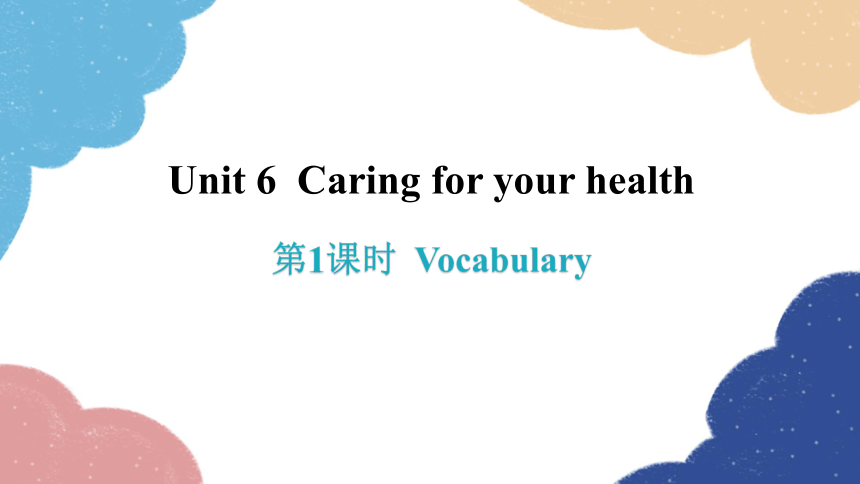 | |
| 格式 | pptx | ||
| 文件大小 | 391.4KB | ||
| 资源类型 | 教案 | ||
| 版本资源 | 牛津深圳版 | ||
| 科目 | 英语 | ||
| 更新时间 | 2022-10-04 10:29:30 | ||
图片预览

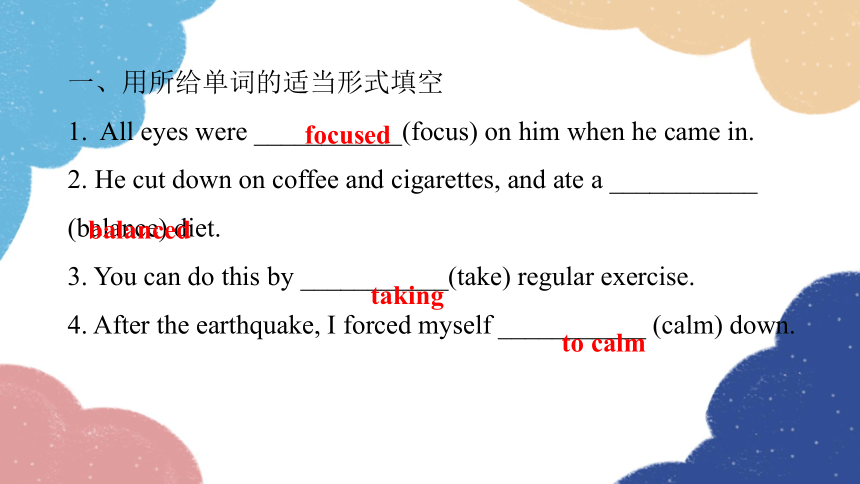
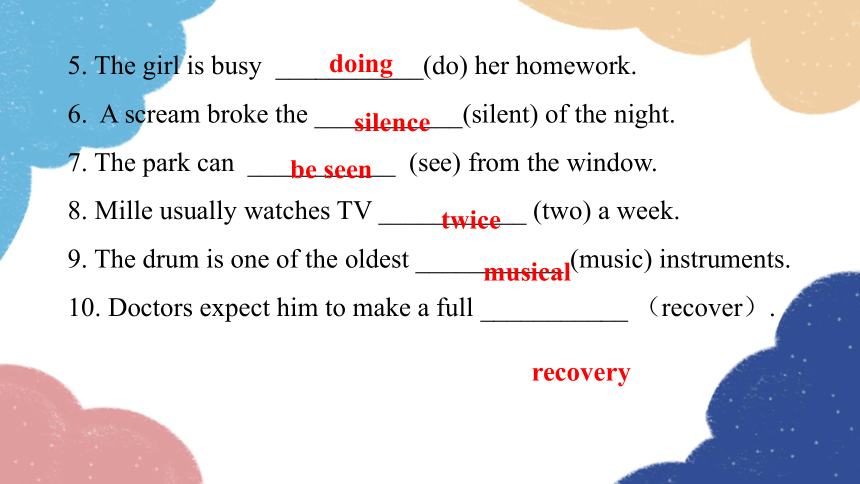
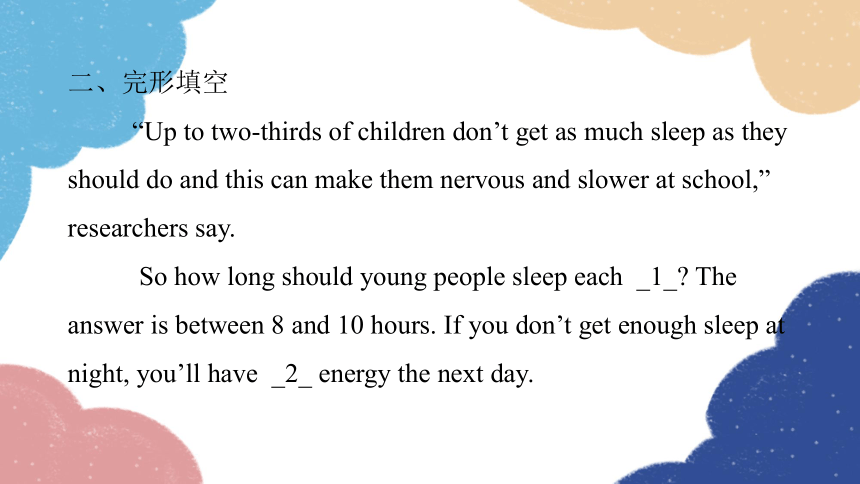
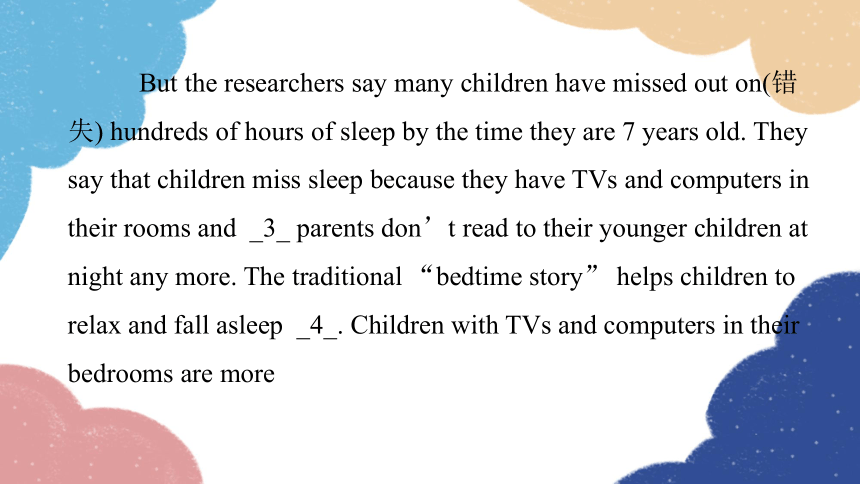

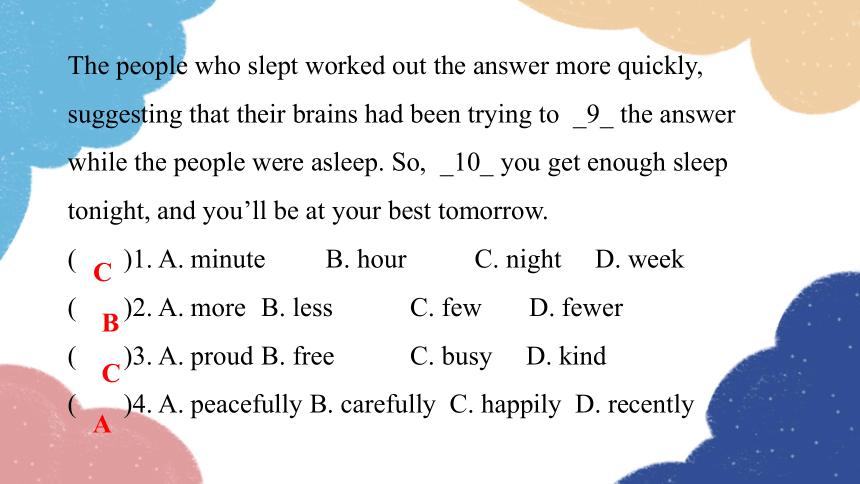
文档简介
(共17张PPT)
Unit 6 Caring for your health
第1课时 Vocabulary
一、用所给单词的适当形式填空
1. All eyes were ___________(focus) on him when he came in.
2. He cut down on coffee and cigarettes, and ate a ___________ (balance) diet.
3. You can do this by ___________(take) regular exercise.
4. After the earthquake, I forced myself ___________ (calm) down.
focused
balanced
taking
to calm
5. The girl is busy ___________(do) her homework.
6. A scream broke the ___________(silent) of the night.
7. The park can ___________ (see) from the window.
8. Mille usually watches TV ___________ (two) a week.
9. The drum is one of the oldest ___________ (music) instruments.
10. Doctors expect him to make a full ___________ (recover).
doing
silence
be seen
twice
musical
recovery
二、完形填空
“Up to two-thirds of children don’t get as much sleep as they should do and this can make them nervous and slower at school,” researchers say.
So how long should young people sleep each _1_ The answer is between 8 and 10 hours. If you don’t get enough sleep at night, you’ll have _2_ energy the next day.
But the researchers say many children have missed out on(错失) hundreds of hours of sleep by the time they are 7 years old. They say that children miss sleep because they have TVs and computers in their rooms and _3_ parents don’t read to their younger children at night any more. The traditional “bedtime story” helps children to relax and fall asleep _4_. Children with TVs and computers in their bedrooms are more
likely to sleep badly and to get less than 8 hours’ sleep. Even _5_ one hour’s sleep a night can mean that children do less well at school.
German scientists think that your _6_ keeps working while you are asleep. To show that they were _7_, they gave two groups of people a problem to work out. One group went to sleep and the other group stayed _8_. What was the result
The people who slept worked out the answer more quickly, suggesting that their brains had been trying to _9_ the answer while the people were asleep. So, _10_ you get enough sleep tonight, and you’ll be at your best tomorrow.
( )1. A. minute B. hour C. night D. week
( )2. A. more B. less C. few D. fewer
( )3. A. proud B. free C. busy D. kind
( )4. A. peacefully B. carefully C. happily D. recently
C
B
C
A
( )5. A. losing B. having C. owning D. getting
( )6. A. head B. brain C. heart D. mind
( )7. A. perfect B. bright C. right D. exact
( )8. A. awake B. alive C. asleep D. aware
( )9. A. get down B. open up C. find out D. work on
( )10. A. make sure B. make up C. build up D. give away
A
B
C
A
C
A
三、阅读理解
Nowadays, many children spend hours a day looking at computer screens or other digital(数码的) products. Some eye care doctors say the screen time has caused more children to have what they call Computer Vision Syndrome(电脑视觉综合征).
Nathan Warford is an optometrist(验光师) in the US. He says that he has seen more children having eye problems.
“More children come into my office because their parents have noticed that they have headaches or red eyes, or because their degree of short-sightedness appears to be increasing very fast and they’re worried, ” he said.
Dr Warford says part of the problem is that even if their eyes start to feel uncomfortable or they start to get a headache, some children don’t tell their parents, because they don’t want their games or the computers to be taken away. Another part of
the problem is that people blink(眨眼睛) less often when they look at the screen. A person who uses a computer or a digital product blinks about a third as much as we normally do in everyday life. If eyes can’t stay wet or are too tired, they will not be protected as usual.
( )1. Which of the following may be caused by too much screen time
A. Having wet eyes. B. Having a headache.
C. Having small eyes. D. Having a toothache.
B
( )2. Why do NOT some children tell their parents when their eyes start to feel uncomfortable
A. Because they think it is not serious.
B. Because they want to continue playing computer games.
C. Because they don’t want their parents to worry.
D. Because their parents don’t care about them.
B
( )3. When will people blink less often
A. When they look at the screen.
B. When they do sports.
C. When they sing songs.
D. When they do the housework.
A
( )4. What can we learn from the passage
A. Children should blink as much as possible.
B. Tears can’t protect eyes.
C. Blinking is good for eyes.
D. It’s useless to blink.
C
( )5. What is the passage mainly about
A. Some information about the latest digital products.
B. Dr Warford’s experience of working out eye problems.
C. Eye problems of children caused by using digital products.
D. Why it’s bad to use computers.
C
THANKS!
Unit 6 Caring for your health
第1课时 Vocabulary
一、用所给单词的适当形式填空
1. All eyes were ___________(focus) on him when he came in.
2. He cut down on coffee and cigarettes, and ate a ___________ (balance) diet.
3. You can do this by ___________(take) regular exercise.
4. After the earthquake, I forced myself ___________ (calm) down.
focused
balanced
taking
to calm
5. The girl is busy ___________(do) her homework.
6. A scream broke the ___________(silent) of the night.
7. The park can ___________ (see) from the window.
8. Mille usually watches TV ___________ (two) a week.
9. The drum is one of the oldest ___________ (music) instruments.
10. Doctors expect him to make a full ___________ (recover).
doing
silence
be seen
twice
musical
recovery
二、完形填空
“Up to two-thirds of children don’t get as much sleep as they should do and this can make them nervous and slower at school,” researchers say.
So how long should young people sleep each _1_ The answer is between 8 and 10 hours. If you don’t get enough sleep at night, you’ll have _2_ energy the next day.
But the researchers say many children have missed out on(错失) hundreds of hours of sleep by the time they are 7 years old. They say that children miss sleep because they have TVs and computers in their rooms and _3_ parents don’t read to their younger children at night any more. The traditional “bedtime story” helps children to relax and fall asleep _4_. Children with TVs and computers in their bedrooms are more
likely to sleep badly and to get less than 8 hours’ sleep. Even _5_ one hour’s sleep a night can mean that children do less well at school.
German scientists think that your _6_ keeps working while you are asleep. To show that they were _7_, they gave two groups of people a problem to work out. One group went to sleep and the other group stayed _8_. What was the result
The people who slept worked out the answer more quickly, suggesting that their brains had been trying to _9_ the answer while the people were asleep. So, _10_ you get enough sleep tonight, and you’ll be at your best tomorrow.
( )1. A. minute B. hour C. night D. week
( )2. A. more B. less C. few D. fewer
( )3. A. proud B. free C. busy D. kind
( )4. A. peacefully B. carefully C. happily D. recently
C
B
C
A
( )5. A. losing B. having C. owning D. getting
( )6. A. head B. brain C. heart D. mind
( )7. A. perfect B. bright C. right D. exact
( )8. A. awake B. alive C. asleep D. aware
( )9. A. get down B. open up C. find out D. work on
( )10. A. make sure B. make up C. build up D. give away
A
B
C
A
C
A
三、阅读理解
Nowadays, many children spend hours a day looking at computer screens or other digital(数码的) products. Some eye care doctors say the screen time has caused more children to have what they call Computer Vision Syndrome(电脑视觉综合征).
Nathan Warford is an optometrist(验光师) in the US. He says that he has seen more children having eye problems.
“More children come into my office because their parents have noticed that they have headaches or red eyes, or because their degree of short-sightedness appears to be increasing very fast and they’re worried, ” he said.
Dr Warford says part of the problem is that even if their eyes start to feel uncomfortable or they start to get a headache, some children don’t tell their parents, because they don’t want their games or the computers to be taken away. Another part of
the problem is that people blink(眨眼睛) less often when they look at the screen. A person who uses a computer or a digital product blinks about a third as much as we normally do in everyday life. If eyes can’t stay wet or are too tired, they will not be protected as usual.
( )1. Which of the following may be caused by too much screen time
A. Having wet eyes. B. Having a headache.
C. Having small eyes. D. Having a toothache.
B
( )2. Why do NOT some children tell their parents when their eyes start to feel uncomfortable
A. Because they think it is not serious.
B. Because they want to continue playing computer games.
C. Because they don’t want their parents to worry.
D. Because their parents don’t care about them.
B
( )3. When will people blink less often
A. When they look at the screen.
B. When they do sports.
C. When they sing songs.
D. When they do the housework.
A
( )4. What can we learn from the passage
A. Children should blink as much as possible.
B. Tears can’t protect eyes.
C. Blinking is good for eyes.
D. It’s useless to blink.
C
( )5. What is the passage mainly about
A. Some information about the latest digital products.
B. Dr Warford’s experience of working out eye problems.
C. Eye problems of children caused by using digital products.
D. Why it’s bad to use computers.
C
THANKS!
